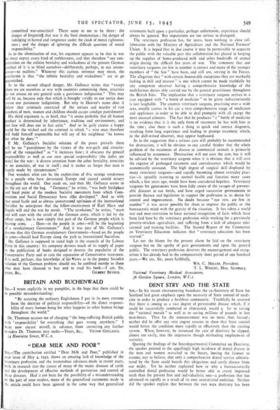DEAR MILK AND POOR"
SIR,—The contribution entitled "Dear Milk and Poor," published in your issue of May 4, 5945, shows an amazing lack of knowledge of the veterinary profession and the tremendous advances ,made in recent years, both in research into the causes of many of the major diseases of cattle and the development of effective methods of prevention and control of these diseases. Had it not been for the possibility of a misunderstanding on the part of your readers, many of the generalised statements made +it the article could have been ignored in the same way that generalised
statements built upon a particular, perhaps unfortunate, experience should always be ignored. But imputations are too serious to disregard.
The veterinary profession has, for years, been working in close col- laboration with the' Ministry of Agriculture and the National Farmers' Union. It is hoped that in due course it may be permissible to acquaint the public with the valuable part this collaboration has played in keeping up the supplies of home-produced milk and other foodstuffs of animal origin during the difficult five years of war. The statement that our veterinary surgeons are few in number is correct and many of the younger members of "the few" have been, and still are, serving in the Forces. The allegation that "with certain honourable exceptions they are markedly lacking in skill and interest" is one which cannot be made truthfully by any competent observer having a comprehensive knowledge of the multifarious duties ably carried out by the general practitioner throughout the British Isles. The implication that a veterinary surgeon arrives to a case equipped with "a bottle of medicine" to be given indiscriminately is just laughable. The country veterinary surgeon, practising over a wide area, usually carries in his car a very comprehensive range of medicines and appliances in order to be able to deal promptly with all except the most unusual ailments. The fact that he produces "a " bottle of medicine is no evidence that it is the only form of treatment he has with him at the time ; also there is such a thing as quick and correct diagnosis, resulting from long experience and leading to prompt treatment which, to the dull-witted observer, may appear haphazard.
As to the suggestion that a serious case will probably be recommended for destruction, it will be obvious to any careful thinker that the whole problem of the treatment of disease in commercial animals is primarily influenced by economics. Destruction will not save the cow, but it will be advised by the veterinary surgeon when it is obvious that it will save the expense of prolonged treatment and convalescence which would be economically unsound. The high degree of surgical skill displayed by many veterinary surgeons—and rapidly becoming almost everyday prac- tice—is speedily restoring to normal health and function many cases which, a few years ago, would have been considered hopeless. Veterinary surgeons for generations have been fully aware of the ravages of prevent- able diseases in our herds, and have urged successive governments to provide finance and legislation to support the profession in its desire for control and improvement. No doubt because "our vets. are few in number" it was never possible for them to impress the public or ths bureaucratic mind with the gravity of the situation. It has taken a world war and near-starvation to force national recognition of facts which have been laid bare by the veterinary profession while working for a previously poverty-stricken agriculture, and suffering from a lack of adequate edu- cational and training facilities. The Second Report of the Committee on Veterinary Education indicates that "veterinary education has been starved."
Let not the blame for the present alarm be laid on the veterinary surgeon but on the apathy of past governments and upon the general public. The veterinary profession deserves the encouragement and recog- nition it has already had in the comparatively short period of one hundred years.—We are, Sir, yours faithfully,
Wm. C. MILLER, President.
36 Gordon Square, London, W.C.r.


























 Previous page
Previous page